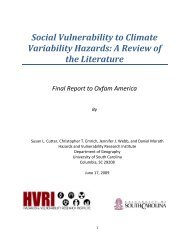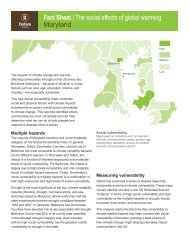Poverty Footprint Study on how the Coca Cola - Oxfam America
Poverty Footprint Study on how the Coca Cola - Oxfam America
Poverty Footprint Study on how the Coca Cola - Oxfam America
You also want an ePaper? Increase the reach of your titles
YUMPU automatically turns print PDFs into web optimized ePapers that Google loves.
Excise taxes<br />
The <strong>Coca</strong>-<strong>Cola</strong> Company and Zambian Breweries<br />
are developing an ec<strong>on</strong>omic case to argue for a<br />
reducti<strong>on</strong> in <strong>the</strong> excise tax levied <strong>on</strong> <strong>the</strong>ir sparkling<br />
beverage products. They argue that excise taxes are<br />
discriminatory and with lower taxes <strong>the</strong>y can grow<br />
<strong>the</strong>ir business and deliver greater ec<strong>on</strong>omic benefits,<br />
including tax revenues, to <strong>the</strong> local ec<strong>on</strong>omy. 68 Excise<br />
taxes <strong>on</strong> sparkling beverages are added to <strong>the</strong> retail<br />
price and increase prices faced by c<strong>on</strong>sumers.<br />
In El Salvador, sparkling beverages have been taxed<br />
since 1978. During years prior to this study, ILC<br />
lobbied <strong>the</strong> central government authorities to remove<br />
excise taxes. Their main argument was that excise<br />
tax <strong>on</strong> local sparkling beverages causes a market<br />
distorti<strong>on</strong> in favor of imported sparkling beverages<br />
and n<strong>on</strong>sparkling beverages and that its eliminati<strong>on</strong><br />
or reducti<strong>on</strong> would lead to additi<strong>on</strong>al sales and thus<br />
a general increase of tax revenue through direct<br />
taxati<strong>on</strong> (i.e. <strong>on</strong> profits). However, a full analysis<br />
taking into account any social costs arising from<br />
increased sales of <strong>Coca</strong>-<strong>Cola</strong> products and less<strong>on</strong>s<br />
learned from o<strong>the</strong>r countries that have abolished<br />
excise tax has not been performed.<br />
Sugar prices<br />
In Zambia, <strong>the</strong> government has established sugar<br />
as a “sensitive and priority product,” which has put<br />
regi<strong>on</strong>al prices ($650/t<strong>on</strong>) well above world market<br />
prices ($300/t<strong>on</strong>). The <strong>Coca</strong>-<strong>Cola</strong> Company and<br />
Zambian Breweries argue that being able to buy<br />
sugar at <strong>the</strong> internati<strong>on</strong>al market price would not<br />
<strong>on</strong>ly reduce procurement costs for <strong>the</strong> <strong>Coca</strong>- <strong>Cola</strong>/<br />
SABMiller value chain and value chain but also allow<br />
reduced costs to Zambian customers, increased<br />
volumes of sales and drive ec<strong>on</strong>omic development<br />
in <strong>the</strong> country. If <strong>the</strong> policy envir<strong>on</strong>ment allowed,<br />
The <strong>Coca</strong>-<strong>Cola</strong> Company and Zambian Breweries<br />
would prefer to buy from lower- price producers of<br />
sugar. Zambia Sugar argues that higher prices have<br />
a direct, positive impact <strong>on</strong> poor agricultural workers<br />
in Zambia. It argues that lower prices from o<strong>the</strong>r<br />
countries are <strong>on</strong>ly possible due to higher levels of<br />
mechanizati<strong>on</strong> and that Zambia’s more labor-intensive<br />
sugar producti<strong>on</strong> techniques should be protected<br />
ra<strong>the</strong>r than threatened.<br />
The Salvadoran government does not currently<br />
regulate <strong>the</strong> price of domestically produced sugar.<br />
However, restricti<strong>on</strong>s are placed <strong>on</strong> imported sugar,<br />
which can <strong>on</strong>ly be imported if domestic demand<br />
cannot be met with local supply—after a disappointing<br />
sugarcane harvest, for example. In this case, <strong>the</strong><br />
importer must pay a 40 percent tariff plus VAT. ILC<br />
sources sugar from its own mill in nearby H<strong>on</strong>duras<br />
76 Exploring <strong>the</strong> links between internati<strong>on</strong>al business and poverty reducti<strong>on</strong><br />
and from local firms through <strong>the</strong> distributor, DIZUCAR.<br />
DIZUCAR and ILC agreed <strong>on</strong> a fixed price for sugar<br />
for a five-year time horiz<strong>on</strong>. Since this time, <strong>the</strong><br />
internati<strong>on</strong>al price of sugar has risen significantly<br />
and DIZUCAR estimates that <strong>the</strong> losses for <strong>the</strong><br />
Salvadoran sugar sector from this c<strong>on</strong>tract amount to<br />
$9.5 milli<strong>on</strong> per year.<br />
Child labor in El Salvador<br />
Child labor has historically been comm<strong>on</strong>place<br />
in Salvadoran sugar harvests. In 1998, <strong>the</strong> sugar<br />
industry established FundAzúcar, which has been<br />
leading <strong>the</strong> effort to eradicate child labor in <strong>the</strong> sector<br />
while improving access to educati<strong>on</strong>, health and<br />
nutriti<strong>on</strong>, and children’s rights. 69<br />
In 2004, after <strong>the</strong> <strong>Coca</strong>-<strong>Cola</strong>/SABMiller value chain<br />
became aware of <strong>the</strong> problem in its own sugar<br />
supply chain, it began working with <strong>the</strong> sugar<br />
industry, government and Internati<strong>on</strong>al Labor<br />
Organizati<strong>on</strong> (ILO) to create a joint plan of acti<strong>on</strong> for<br />
ending child labor in sugarcane harvesting. Toge<strong>the</strong>r,<br />
<strong>the</strong>y agreed to communicate a zero-tolerance policy<br />
for child labor. Central Izalco and El Angel, <strong>the</strong> mills<br />
supplying ILC, enforced this zero-tolerance policy by<br />
refusing to accept sugarcane from producers who<br />
employed children.<br />
Between 2004 and 2008, <strong>the</strong> ILO made multimilli<strong>on</strong><br />
dollar investments in programs to combat child labor<br />
in sugarcane harvesting. In coordinati<strong>on</strong> with <strong>the</strong> ILO,<br />
<strong>the</strong> Salvadoran Sugar Associati<strong>on</strong> funded farm labor<br />
m<strong>on</strong>itors and social advocates for farm families, and<br />
The <strong>Coca</strong>-<strong>Cola</strong> Company funded a pilot program<br />
to identify safe, alternative income-generati<strong>on</strong><br />
opportunities for teens living <strong>on</strong> farms. As a result of<br />
<strong>the</strong>se multistakeholder efforts, during that period <strong>the</strong><br />
incidence of child labor <strong>on</strong> sugar farms in El Salvador<br />
dropped by 72 percent compared to incidence rates<br />
in 2004 as tracked by <strong>the</strong> Salvadoran government’s<br />
Ministry of Educati<strong>on</strong>.<br />
Social initiatives linked to public policy<br />
SABMiIIer’s bottling plant, ILC, and The <strong>Coca</strong>-<strong>Cola</strong><br />
Company regularly make social investments in El<br />
Salvador. Between 2008 and 2010, The <strong>Coca</strong>-<strong>Cola</strong><br />
Company invested more than $1.3 milli<strong>on</strong> in social<br />
programs in local communities, including programs<br />
in local schools to fund envir<strong>on</strong>mental educati<strong>on</strong> and<br />
<strong>the</strong> installment of waste and sanitati<strong>on</strong> facilities. In<br />
2009, The <strong>Coca</strong>-<strong>Cola</strong> Company spent $210,000 <strong>on</strong><br />
envir<strong>on</strong>mental protecti<strong>on</strong> and improved livelihood<br />
projects for 400 families living around <strong>the</strong> San Ant<strong>on</strong>io<br />
River. The <strong>Coca</strong>-<strong>Cola</strong> Company also funds “Apuntate<br />
a Jugar,” a program to promote active, healthy living<br />
in schools that benefited over 3,000 Salvadoran<br />
children between 2008 and 2010.




